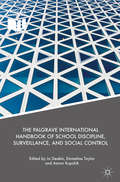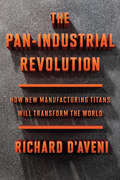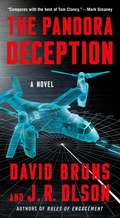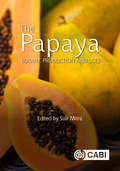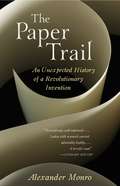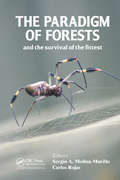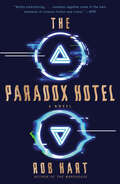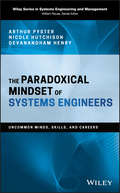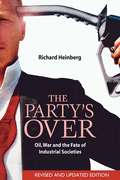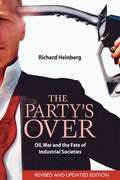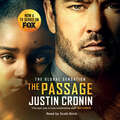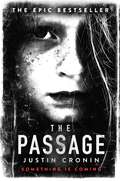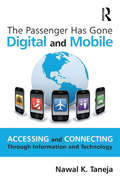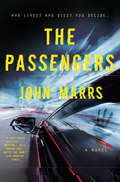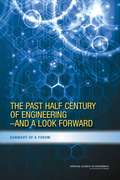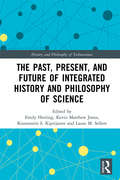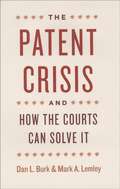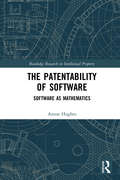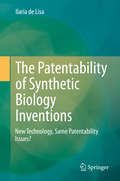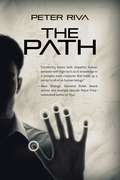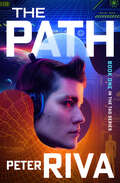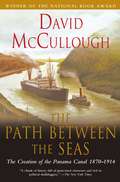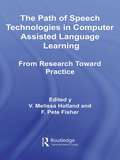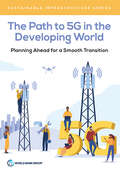- Table View
- List View
The Palgrave International Handbook of School Discipline, Surveillance, and Social Control
by Aaron Kupchik Emmeline Taylor Jo DeakinTruly international in scope, this Handbook focuses on approaches to discipline, surveillance and social control from around the world, critically examining the strategies and practices schools employ to monitor students and control their behavior. Bringing together leading scholars from a range of disciplinary backgrounds, the chapters scrutinize, analyze and compare schools' practices across the globe, providing a critical review of existing evidence, debates and understandings, while looking forward to address emerging important questions and key policy issues. The chapters are divided into four sections. Part 1 offers accounts of international trends in school discipline, surveillance and punishment; Part 2 examines the merging of school strategies with criminal justice practices; Part 3 focuses on developments in school technological surveillance; and Part 4 concludes by discussing restorative and balanced approaches to school discipline and behavior management. As the first Handbook to draw together these multiple themes into one text, and the first international comparative collection on school discipline, surveillance and social control, it will appeal to scholars across a range of fields including sociology, education, criminology, critical security studies and psychology, providing a unique, timely, and indispensable resource for undergraduate educators and researchers.
The Pan-Industrial Revolution: How New Manufacturing Titans Will Transform the World
by Richard D'AveniThe acclaimed author of Strategic Capitalism presents a provocative new vision of global industry in the age of 3-D printing: &“essential business reading&” (Kirkus, starred review). With books like Hypercompetition and Strategic Capitalism, Richard D&’Aveni has established himself as a business strategist of uncanny prescience. In The Pan-Industrial Revolution, he demonstrates how the advent of industrial‑scale 3‑D printing is already happening under the radar, and that it will have a far‑reaching impact that most corporate and governmental leaders have yet to anticipate or understand. 3-D printing, now called additive manufacturing, has moved far beyond a desktop technology used by hobbyists to churn out trinkets and toys. In this eye-opening account, D&’Aveni reveals how recent breakthroughs have been secretly adapted by Fortune 500 companies to revolutionize the manufacture jet engines, airplanes, automobiles, and so much more. D&’Aveni explains how this technology will transform the landscape of manufacturing, and the dramatic effect this change will have on the world economy. A handful of massively powerful corporations—what D&’Aveni calls pan‑industrials—will become as important as any tech giant in re-structuring the global order.
The Pandora Deception: A Novel (The WMD Files #4)
by David Bruns J. R. OlsonWith The Pandora Deception, Bruns and Olson return with a captivating portrayal of modern day combat that "compares with the best of the timeless classics by Tom Clancy, Dale Brown, and Stephen Coonts." (Mark Greaney) To effectively combat the rise of global terrorism, the U.S. military must now rely on more than traditional weapons and tactics. Don Riley of the U.S. Cyber Command is given charge of a brand new effort: a new team in the CIA Operations Directorate called Emerging Threats. To establish this team he recruits three talented recent commissioned naval officers—Janet Everett, Michael Goodwin, and Andrea Ramirez—and together they uncover a new terrorist group. The group is going under the name of the Mahdi, a messiah figure of Islamic mythology, and is operating in the geopolitical tinderbox that is the Nile River basin. But the Mahdi is no ordinary terrorist group. Their stock in trade is not the usual suicide bombings and surprise attacks. In fact, the Mahdi has created and is about to release the worst kind of weapon: a hugely destructive bioweapon, known as Pandora, with a devastating fatality rate. And it will take all the resources that the U.S. can bring to bear—intelligence assets, cyber warfare and military assaults—to not only find out who is really behind the Mahdi, but to stop them before they successfully destroy the balance of power in the Middle East.
The Papaya: Botany, Production and Uses (Botany, Production and Uses)
by Amalendu Ghosh Robert E Paull Víctor Galán Saúco Edward Evans Rebecca Ford S H Ahmad Christian Alcocer Fredy H Ballen Luis Barboza-Barquero Paul R Campbell A Chan Fure-Chyi Chen Nancy Jung Chen Ting-Chi Cheng Shih Wen Chin Rod Drew Franscisco Espadas Humberto Estrella João Paulo Fabi Gabriela Fuentes Amaranta Giron Julián Cuevas González Eric Guevara Marco V Gutiérrez-Soto Eudaldo Pérez Hernández Jian-Zhi Huang Víctor M Jiménez Chutchamas Kanchana-Udomkan Matiyar Rahaman Khan Chen-Yu Lee Wen-Li Lee Pauziah Muda M Munirah Usana Nantawan Eder Dutra Resende Jorge Manuel Santamaria-Fernandez S K Sharma N I Shukor N E Tajidin Carlos Talavera Lynton L Vawdrey Ziwei ZhouPapaya (Carica papaya) is an important and widely-cultivated tropical fruit, grown in more than 60 countries of the world. Global papaya production has grown significantly over the last few years, mainly as a result of increased production in India. Papaya has become an important agricultural export for developing countries where export revenues of the fruit provide a livelihood for thousands of people, especially in Asia and Latin America. This book includes coverage of recent research developments with the potential to improve crop yields and quality. New research has contributed to our understanding of the crop environment, plant growth and physiology of tree and fruit development with implications for both breeding and cultivation. It looks at how analysis of the papaya genome promises new, faster breeding techniques to improved cultivars and how these and other advances are helping to tackle disease like papaya ring spot viruses and major pests which cause significant losses. Key features include: updated information for sustainable papaya cultivation research developments in tackling the major production and post-harvest problems interdisciplinary and collaborative research With contributions from international experts, the book presents the current state of knowledge concerning the history, physiology, culture and marketing of papaya throughout the world. It is an essential resource for researchers, growers and all those involved in the papaya industry.
The Paper Trail: An Unexpected History of a Revolutionary Invention
by Alexander MonroA sweeping, richly detailed history that tells the fascinating story of how paper--the simple Chinese invention of two thousand years ago--wrapped itself around our world, humankind's most momentous ideas imprinted on its surface. The emergence of paper in the imperial court of Han China brought about a revolution in the transmission of knowledge and ideas, allowing religions, philosophies and propaganda to spread with ever greater ease. The first writing surface sufficiently cheap, portable and printable for books, pamphlets and journals to be mass-produced and distributed widely, paper opened the way for an unprecedented, ongoing dialogue between individuals and between communities across continents, oceans and time. The Paper Trail explores how the new substance was used to solidify social and political systems that influenced China even into our own time. We see how paper made possible the spread of the then new religions of Buddhism and Manichaeism into Japan, Korea and Vietnam . . . how it enabled theologians, scientists and artists to build the vast and signally intellectual empire of the Abbasid Caliphate and embed the Koran in popular culture . . . how paper was carried along the Silk Road by merchants and missionaries, finally reaching Europe in the late thirteenth century . . . and how, once established in Europe, along with the printing press, paper played an essential role in the three great foundations of Western modernity: the Renaissance, the Reformation and the Scientific Revolution. Here is a dramatic, comprehensively researched, vividly written story populated by holy men and scholars, warriors and poets, rulers and ordinary men and women--an essential story brilliantly told in this luminous work of history.From the Hardcover edition.
The Paper Trail: An Unexpected History of a Revolutionary Invention
by Alexander MonroA sweeping, richly detailed history that tells the fascinating story of how paper—the simple Chinese invention of two thousand years ago—wrapped itself around our world, humankind’s most momentous ideas imprinted on its surface. The emergence of paper in the imperial court of Han China brought about a revolution in the transmission of knowledge and ideas, allowing religions, philosophies and propaganda to spread with ever greater ease. The first writing surface sufficiently cheap, portable and printable for books, pamphlets and journals to be mass-produced and distributed widely, paper opened the way for an unprecedented, ongoing dialogue between individuals and between communities across continents, oceans and time. The Paper Trail explores how the new substance was used to solidify social and political systems that influenced China even into our own time. We see how paper made possible the spread of the then new religions of Buddhism and Manichaeism into Japan, Korea and Vietnam . . . how it enabled theologians, scientists and artists to build the vast and signally intellectual empire of the Abbasid Caliphate and embed the Koran in popular culture . . . how paper was carried along the Silk Road by merchants and missionaries, finally reaching Europe in the late thirteenth century . . . and how, once established in Europe, along with the printing press, paper played an essential role in the three great foundations of Western modernity: the Renaissance, the Reformation and the Scientific Revolution. Here is a dramatic, comprehensively researched, vividly written story populated by holy men and scholars, warriors and poets, rulers and ordinary men and women—an essential story brilliantly told in this luminous work of history.From the Hardcover edition.
The Paradigm of Forests and the Survival of the Fittest
by Sergio A. Molina-Murillo Carlos Rojas AlvaradoThis book demonstrates the social, historical, and environmental framework within which humans have developed a relationship with the forest and its resources. Starting from the biological basis that permits the existence of forests to the use of forest resources in a modern human context, this book summarizes the interaction between humans and forest ecosystems. Designed for readers from a broad range of disciplines and interests including those from environmental sciences, environmental economics, sociology, anthropology, biology, forestry and human ecology and other related disciplines, the book evokes interest in the development of an integrated approach towards forest ecosystems and natural resources in the context of sustainability.
The Paradox Hotel: A Novel
by Rob HartAn impossible crime. A detective on the edge of madness. The future of time travel at stake. From the author of The Warehouse . . . &“An engrossing and thought-provoking sci-fi mystery that is also an achingly beautiful meditation on grief and the pain of lost love.&”—S. A. Cosby, New York Times bestselling author of Razorblade TearsONE OF THE MOST ANTICIPATED BOOKS OF 2022—CrimeReadsJanuary Cole&’s job just got a whole lot harder.Not that running security at the Paradox was ever really easy. Nothing&’s simple at a hotel where the ultra-wealthy tourists arrive costumed for a dozen different time periods, all eagerly waiting to catch their &“flights&” to the past.Or where proximity to the timeport makes the clocks run backward on occasion—and, rumor has it, allows ghosts to stroll the halls.None of that compares to the corpse in room 526. The one that seems to be both there and not there. The one that somehow only January can see.On top of that, some very important new guests have just checked in. Because the U.S. government is about to privatize time-travel technology—and the world&’s most powerful people are on hand to stake their claims.January is sure the timing isn&’t a coincidence. Neither are those &“accidents&” that start stalking their bidders.There&’s a reason January can glimpse what others can&’t. A reason why she&’s the only one who can catch a killer who&’s operating invisibly and in plain sight, all at once.But her ability is also destroying her grip on reality—and as her past, present, and future collide, she finds herself confronting not just the hotel&’s dark secrets but her own.At once a dazzlingly time-twisting murder mystery and a story about grief, memory, and what it means to—literally—come face-to-face with our ghosts, The Paradox Hotel is another unforgettable speculative thrill ride from acclaimed author Rob Hart.
The Paradoxical Mindset of Systems Engineers: Uncommon Minds, Skills, and Careers (Wiley Series in Systems Engineering and Management)
by Arthur Pyster Nicole Hutchison Devanandham HenryA guide that explores what enables systems engineers to be effective in their profession and reveals how organizations can help them attain success The Paradoxical Mindset of Systems Engineers offers an in-depth look at the proficiencies and personal qualities effective systems engineers require and the positions they should seek for successful careers. The book also gives employers practical strategies and tools to evaluate their systems engineers and advance them to higher performance. The authors explore why systems engineers are uncommon and how they can assess, improve, and cleverly leverage their uncommon strengths. These insights for being an ever more effective systems engineer apply equally well to classic engineers and project managers who secondarily do some systems engineering. The authors have written a guide to help systems engineers embrace the values that are most important to themselves and their organizations. Solidly based on interviews with over 350 systems engineers, classic engineers, and managers as well as detailed written career descriptions from 2500 systems engineers — The Paradoxical Mindset of Systems Engineers identifies behavioral patterns that effective systems engineers use to achieve success. This important resource: Offers aspiring systems engineers practical methods for success that are built on extensive empirical evidence and underlying theory Shows systems engineers how to visually document their relative strengths and weaknesses, map out their careers, and compare themselves to the best in their organizations – a rich set of tools for individuals, mentors, and organizations Offers practical guidance to managers and executives who lead systems engineering workforce improvement initiatives Written for systems engineers, their managers, business executives, those who do some systems engineering but primarily identify with other professions, as well as HR professionals, The Paradoxical Mindset of Systems Engineers offers the most comprehensive career guidance in the field available today.
The Party's Over
by Richard HeinbergThe world is about to run out of cheap oil and change dramatically. Within the next few years, global production will peak. Thereafter, even if industrial societies begin to switch to alternative energy sources, they will have less net energy each year to do all the work essential to the survival of complex societies. We are entering a new era, as different from the industrial era as the latter was from medieval times. In The Party's Over, Richard Heinberg places this momentous transition in historical context, showing how industrialism arose from the harnessing of fossil fuels, how competition to control access to oil shaped the geopolitics of the twentieth century and how contention for dwindling energy resources in the twenty-first century will lead to resource wars in the Middle East, Central Asia and South America. He describes the likely impacts of oil depletion and all of the energy alternatives. Predicting chaos unless the United States--the world's foremost oil consumer--is willing to join with other countries to implement a global program of resource conservation and sharing, he also recommends a "managed collapse" that might make way for a slower-paced, low-energy, sustainable society in the future. More readable than other accounts of this issue, with fuller discussion of the context, social implications and recommendations for personal, community, national and global action, Heinberg's updated book is a riveting wake-up call for human-kind as the oil era winds down, and a critical tool for understanding and influencing current US foreign policy.
The Party's Over: Oil, War and the Fate of Industrial Societies
by Richard HeinbergDiscusses, with documentation, when oil production is likely to peak and then begin to decline, and what will be the likely consequences of that decline. Also discusses ways the decline could be dealt with, from a personal to a global perspective.
The Passage: The original post-apocalyptic virus thriller: chosen as Time Magazine's one of the best books to read during self-isolation in the Coronavirus outbreak (The Passage Trilogy #1)
by Justin CroninAmy Harper Bellafonte is six years old and her mother thinks she's the most important person in the whole world.She is.Anthony Carter doesn't think he could ever be in a worse place than Death Row.He's wrong.FBI agent Brad Wolgast thinks something beyond imagination is coming.It is.THE PASSAGE.(p) 2010 Penguin Random House LLC
The Passage: The original post-apocalyptic virus thriller: chosen as Time Magazine’s one of the best books to read during self-isolation in the Coronavirus outbreak
by Justin CroninNOW A MAJOR TV SERIES!'THE STAND meets THE ROAD' Entertainment Weekly'Enthralling ... richly imagined. Above all, Amy is a superb creation, believably human yet beguilingly enigmatic' Sunday TimesAmy Harper Bellafonte is six years old and her mother thinks she's the most important person in the whole world.She is.Anthony Carter doesn't think he could ever be in a worse place than Death Row.He's wrong.FBI agent Brad Wolgast thinks something beyond imagination is coming.It is.'Read 15 pages, and you will find yourself captivated; read 30 and you will find yourself taken prisoner and reading late into the night. It had the vividness that only epic works of fantasy and imagination can achieve. What else can I say? This: read this book and the ordinary world disappears' Stephen King
The Passenger Has Gone Digital and Mobile: Accessing and Connecting Through Information and Technology
by Nawal K. TanejaTechnology is changing expectations in the airline industry. Passengers want to be in control, and they expect airlines to become solution providers and aggregators of value, to provide them with personalized services. Airline employees expect to be given the tools to do their jobs and to meet passenger expectations. Airline executives expect to make returns that are reasonable and relatively stable through business cycles. All of these expectations can be met by airlines through the effective and efficient leveraging of information and technology, to shift from being operations- and product-centric to becoming customer-centric and dramatically improving the overall passenger travel experience throughout the travel cycle. In this new book by world-renowned airline expert Nawal K. Taneja, the 7th in a series with Ashgate, the author explores and explains the game-changing opportunities presented to the industry by new-generation information and technology. He shows how information and technology can now drive, not just enable, an airline's strategy to become truly customer-centric at a personalized level, while at the same time enabling the operator to reduce costs, enhance revenues, reduce risks and become much more flexible and agile by better managing complexity.
The Passengers
by John MarrsYou’re riding in your self-driving car when suddenly the doors lock, the route changes and you have lost all control. Then, a mysterious voice tells you, “You are going to die.” Just as self-driving cars become the trusted, safer norm, eight people find themselves in this terrifying situation, including a faded TV star, a pregnant young woman, an abused wife fleeing her husband, an illegal immigrant, a husband and wife, and a suicidal man. From cameras hidden in their cars, their panic is broadcast to millions of people around the world. But the public will show their true colors when they are asked, "Which of these people should we save?...And who should we kill first?"
The Past Half Century of Engineering---And a Look Forward: Summary of a Forum
by Steve OlsonEngineering is poised to make an even greater contribution to society in the next half century than it has made in the past half century. At its annual meeting on September 28-29, 2014, the National Academy of Engineering celebrated the 50th anniversary of its founding. A highlight of the meeting was a forum of distinguished speakers who considered the achievements of the last 50 years and looked toward the potential achievements of the next 50. "The Past Half Century of Engineering - and a Look Forward" summarizes their presentations.
The Past, Present, and Future of Integrated History and Philosophy of Science (History and Philosophy of Technoscience)
by Emily Herring Kevin Matthew Jones Konstantin S. Kiprijanov Laura M SellersIntegrated History and Philosophy of Science (iHPS) is commonly understood as the study of science from a combined historical and philosophical perspective. Yet, since its gradual formation as a research field, the question of how to suitably integrate both perspectives remains open. This volume presents cutting edge research from junior iHPS scholars, and in doing so provides a snapshot of current developments within the field, explores the connection between iHPS and other academic disciplines, and demonstrates some of the topics that are attracting the attention of scholars who will help define the future of iHPS.
The Patent Crisis and How the Courts Can Solve It
by Dan L. Burk Mark A. LemleyPatent law is crucial to encourage technological innovation. But as the patent system currently stands, diverse industries from pharmaceuticals to software to semiconductors are all governed by the same rules even though they innovate very differently. The result is a crisis in the patent system, where patents calibrated to the needs of prescription drugs wreak havoc on information technologies and vice versa. According to Dan L. Burk and Mark A. Lemley in The Patent Crisis and How the Courts Can Solve It, courts should use the tools the patent system already gives them to treat patents in different industries differently. Industry tailoring is the only way to provide an appropriate level of incentive for each industry. Burk and Lemley illustrate the barriers to innovation created by the catch-all standards in the current system. Legal tools already present in the patent statute, they contend, offer a solution--courts can tailor patent law, through interpretations and applications, to suit the needs of various types of businesses. The Patent Crisis and How the Courts Can Solve It will be essential reading for those seeking to understand the nexus of economics, business, and law in the twenty-first century.
The Patentability of Software: Software as Mathematics (Routledge Research in Intellectual Property)
by Anton HughesThis book explores the question of whether software should be patented. It analyses the ways in which the courts of the US, the EU, and Australia have attempted to deal with the problems surrounding the patentability of software and describes why it is that the software patent issue should be dealt with as a patentable subject matter issue, rather than as an issue of novelty or nonobviousness. Anton Hughes demonstrates that the current approach has failed and that a fresh approach to the software patent problem is needed. The book goes on to argue against the patentability of software based on its close relationship to mathematics. Drawing on historical and philosophical accounts of mathematics in pursuit of a better understanding of its nature and focusing the debate on the conditions necessary for mathematical advancement, the author puts forward an analytical framework centred around the concept of the useful arts. This analysis both explains mathematics’, and therefore software’s, nonpatentability and offers a theory of patentable subject matter consistent with Australian, American, and European patent law.
The Patentability of Synthetic Biology Inventions: New Technology, Same Patentability Issues?
by Ilaria de LisaThis book addresses Synthetic Biology (SynBio), a new and promising biotechnology that has attracted much interest from both a scientific and a policy perspective. Yet, questions concerning the patentability of SynBio inventions have not been examined in detail so far; as a result, it remains unclear whether these inventions are patentable on the basis of current norms and case law. The book addresses this question, focusing especially on the subject matter’s eligibility and moral criteria. It provides an overview of the legislation and decisions applicable to SynBio patents and examines this new technology in view of the ongoing debate over the patentability of biotechnologies in general. The legal analysis is complemented by the practical examination of several patent applications submitted to the European and US patent offices (EPO and USPTO), and by an assessment of the patent issues that are likely to be raised by future SynBio developments.
The Path (The Tag Series #1)
by Peter RivaAll life on earth is about to be terminated by an entity as old as the galaxy itself. To make matters worse, Simon has broken everything already.In a future world that is run by computer systems and that is without want, how can a man find his role? Then, if the very computers he works on to try to make them more human suddenly try to kill him, revealing a secret so vast that it affects every living soul on the planet, can that man be a hero?These are the questions that face the stumbling, comic, and certainly flawed Simon Bank. His job is to work with the System’s artificial intelligence, making it fit more perfectly into human society so that it can keep the country running smoothly. But when the System threatens the peaceful world he knows, Simon suddenly must rush to save his own life, as well as the life of everyone on earth. Forced to reassess everything that he thought he knew, he is caught within circumstances way beyond his control.Simon’s only hope is to rely on intellect and instincts he didn’t know he had, and on new friends, not all of them human, to change himself and all humanity. And he doesn’t have much time.Skyhorse Publishing, under our Night Shade and Talos imprints, is proud to publish a broad range of titles for readers interested in science fiction (space opera, time travel, hard SF, alien invasion, near-future dystopia), fantasy (grimdark, sword and sorcery, contemporary urban fantasy, steampunk, alternative history), and horror (zombies, vampires, and the occult and supernatural), and much more. While not every title we publish becomes a New York Times bestseller, a national bestseller, or a Hugo or Nebula award-winner, we are committed to publishing quality books from a diverse group of authors.
The Path (The Tag Series)
by Peter RivaAI threatens to destroy humanity, and only one computer expert can stop it in this cyberpunk thriller by the author of Murder on Safari. Simon Bank lives in a future where just about everything in America is run by the System—the food supply, the weather, national security, and more. Everyone is free from want. Individuals can control where they live and where they go to school. They can have a relationship with whomever they like. They can set their own hours for work and work whatever job they like. Simon is a codifier who works with the System&’s artificial intelligence to humanize it and to help it run the country more smoothly. But when a tornado tears up Manhattan, Simon realizes the System has a terrifying secret and is a threat to humankind. Now, with only his intellect and instincts, plus a few new friends—human and artificial—Simon must race against the clock to save himself and the world. And he better be careful. There&’s no telling what the System might do if it feels threatened . . . &“Excellently mixes both empathic human behavior with high-tech sci-fi knowledge in a complex main character that holds up a mirror to all of us human beings.&” —Bavo Dhooge, Diamond Bullet Award–winning author of Styx
The Path Between the Seas: The Creation of the Panama Canal, 1870-1914 (Ensayo Y Pensamiento Ser.)
by David McCulloughThe National Book Award–winning epic chronicle of the creation of the Panama Canal, a first-rate drama of the bold and brilliant engineering feat that was filled with both tragedy and triumph, told by master historian David McCullough.From the Pulitzer Prize–winning author of Truman, here is the national bestselling epic chronicle of the creation of the Panama Canal. In The Path Between the Seas, acclaimed historian David McCullough delivers a first-rate drama of the sweeping human undertaking that led to the creation of this grand enterprise. The Path Between the Seas tells the story of the men and women who fought against all odds to fulfill the 400-year-old dream of constructing an aquatic passageway between the Atlantic and Pacific oceans. It is a story of astonishing engineering feats, tremendous medical accomplishments, political power plays, heroic successes, and tragic failures. Applying his remarkable gift for writing lucid, lively exposition, McCullough weaves the many strands of the momentous event into a comprehensive and captivating tale. Winner of the National Book Award for history, the Francis Parkman Prize, the Samuel Eliot Morison Award, and the Cornelius Ryan Award (for the best book of the year on international affairs), The Path Between the Seas is a must-read for anyone interested in American history, the history of technology, international intrigue, and human drama.
The Path of Speech Technologies in Computer Assisted Language Learning: From Research Toward Practice (Routledge Studies in Computer Assisted Language Learning #Vol. 4)
by V. Melissa Holland F. Pete FisherThis collection examines the promise and limitations for computer-assisted language learning of emerging speech technologies: speech recognition, text-to-speech synthesis, and acoustic visualization. Using pioneering research from contributors based in the US and Europe, this volume illustrates the uses of each technology for learning languages, the problems entailed in their use, and the solutions evolving in both technology and instructional design. To illuminate where these technologies stand on the path from research toward practice, the book chapters are organized to reflect five stages in the maturation of learning technologies: basic research, analysis of learners’ needs, adaptation of technologies to meet needs, development of prototypes to incorporate adapted technologies, and evaluation of prototypes. The volume demonstrates the progress in employing each class of speech technology while pointing up the effort that remains for effective, reliable application to language learning.
The Path to 5G in the Developing World: Planning Ahead for a Smooth Transition (Sustainable Infrastructure)
by World BankThe global race for implementing 5G mobile technologies has seen countries riding a new wave of wireless technologies. 5G—the next generation of mobile technologies—can enable a significantly higher level of performance over 4G mobile communications, providing a new layer of connectivity to support innovative, data-intensive applications. With the estimated impact of 5G on global gross domestic product to be in the trillions of US dollars, 5G’s deployment will drive innovation, job creation, worker productivity, and competitiveness across various sectors. Several use cases are already being tested, and deployment is under way in many countries. For some countries, 5G may seem a distant future prospect given the costs of infrastructure deployment and the need for expensive handsets; for other countries, 5G is an on-ramp to Industry 4.0 and has been folded into national strategy planning. 5G trials, pilots, and commercial deployments have been progressing around the world, but most deployments are in higher-income countries. Significant barriers remain for developing countries, many of which pertain to the challenges faced by the broader telecommunications sector and all of which threaten to further widen the digital divide and limit access to the economic opportunities that 5G connectivity enables. What does this reality mean for developing countries, and how can national governments prepare? The Path to 5G in the Developing World: Planning Ahead for a Smooth Transition surveys the technical capabilities of 5G and explores how countries can reach connectivity goals by using 5G as a layer of connectivity along with 4G and other technologies. This report also provides a guide for policy makers to better understand the opportunities, challenges, and risks posed by 5G so that they can plan for a policy and regulatory ecosystem that supports the path to advanced mobile network deployment, access, and adoption.
